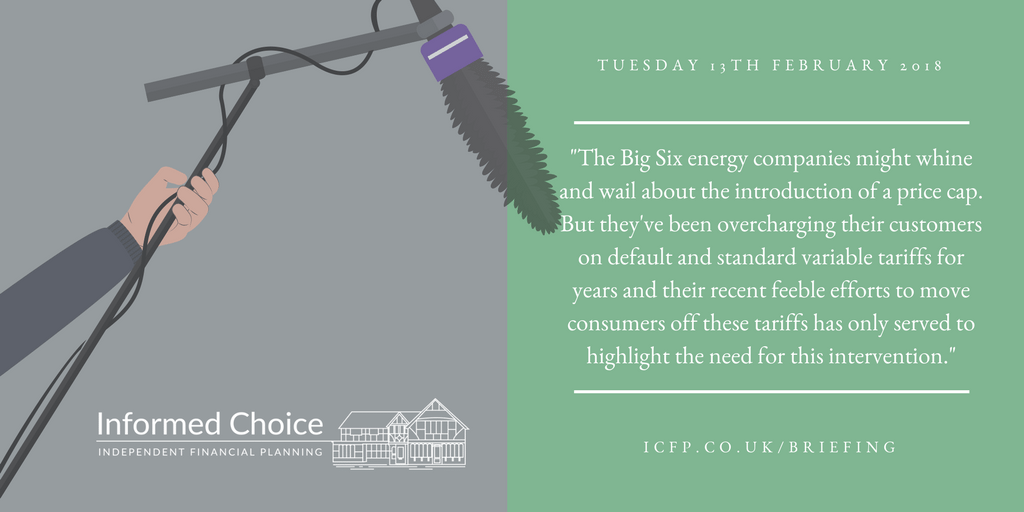In this edition of The Briefing from Informed Choice on Tuesday 13th February 2018 – urgent need for energy price cap, much to gain from US trade deal, consumer credit fears overblown, and risky cryptocurrency warning.
Subscribe to The Briefing by email
Enable the Amazon Alexa Flash Briefing Skill
Urgent need for energy price cap
An influential committee of MPs has said the government’s planned energy bill price cap should be introduced urgently. The Business, Energy and Industrial Strategy Committee said competition in the energy market is not working and has failed to deliver fair prices for consumers.
It is calling for the energy cap to be temporary and fixed at an absolute level, rather than relative to other tariffs. The committee said it was “underwhelmed by the feeble steps” taken to date by energy providers trying to avoid government action.
Committee chairwoman Rachel Reeves said:
The Big Six energy companies might whine and wail about the introduction of a price cap.
But they’ve been overcharging their customers on default and standard variable tariffs for years and their recent feeble efforts to move consumers off these tariffs has only served to highlight the need for this intervention.
Much to gain from US trade deal
British opponents of a US-UK trade deal have tended to exaggerate the risks. This includes fears that it would inevitably lead to the ‘Americanisation’ of the NHS, a free-for-all for powerful multinational corporations, or a race to the bottom in food standards.
This is according to a new briefing from the Institute of Economic Affairs. The briefing explains the benefits of such an agreement, arguing that an early deal with the US would help post-Brexit Britain to set out its stall as a global champion of free trade. A deal would also help in the harder tasks that lie ahead in gaining deals with emerging economies such as China and India.
Commenting on the briefing, its author Julian Jessop, said:
Not only would a US-UK trade deal further strengthen one of the UK’s closest relationships, it would help post-Brexit Britain to set out its stall as a global champion of free trade.
As long as we escape the constraints of the EU’s customs union and restrictive regulations, the UK will be able to forge a trade deal with the US more quickly than the EU ever could.
The opportunities to consumers are huge; it’s time to ignore the naysayers and recognise the path to prosperity Brexit provides.
Consumer credit fears overblown
A new report from the Resolution Foundation has warned that the continuing overhang from the last credit crisis is of greater concern than the recent rise in consumer credit growth or threat of rising interest rates.
Consumer credit levels have risen at just under 10% in the last year. Overall household debt now totals £1.9 trillion and the Bank of England now says interest rates may rise faster than previously expected.
The cost of servicing Britain’s household debt is low by historical standards, with repayments currently accounting for 7.7% of disposable income. This is well below the 12.3% recorded just before the financial crisis, and in line with the level seen during the mid-1990s and early 2000s.
However, a significant number of households continue to have high debt burdens. Households headed by someone aged 25-34 spent nearly £1 in every £5 of their pre-tax income on debt repayments in 2017, compared to 20p for households aged 65 and over.
Matt Whittaker, Chief Economist at the Resolution Foundation, said:
Rapidly rising consumer credit and the prospect of faster interest rate rises have led some to warn loudly of the imminent bursting of another credit bubble. But these fears appear to be overblown, with much of the recent credit growth being driven by higher income households who are much better placed to service their debts.
However, while the recent growth in debt is less of a concern, it is very worrying that almost half of low income families are already showing signs of debt distress. While rates have been at historic lows for a decade now, many families have experienced a tight income squeeze over this period and have not been able to get back on the front foot when it comes to servicing their debts.
Risky cryptocurrency warning
The European Supervisory Authorities have warned that cryptocurrencies, including bitcoin, represent “highly risky” assets as a result of their unregulated status. The ESAs have said those who invest in cryptocurrencies should be prepared to “lose a large amount, or even all, of the money invested.”
In a joint statement, the three EU financial regulators said:
The ESAs warn consumers that VCs (virtual currencies) are highly risky and unregulated products and are unsuitable as investment, savings or retirement planning products.
They also noted that cryptocurrencies shown “clear signs of a pricing bubble.”
Bitcoin, the most popular cryptocurrency, has lost around 40% of its value since the start of the year, although rose by more than 700% in the past twelve months.
Subscribe to The Briefing by email
Enable the Amazon Alexa Flash Briefing Skill
 Informed Choice Radio provides a regular personal finance and investment news summary, with an updated Flash Briefing for your Alexa enabled device. Search for Informed Choice Radio in your Amazon Alexa app or visit https://www.amazon.co.uk/Informed-Choice-Radio/dp/B074DZZ1MF/ to enable this Flash Briefing.
Informed Choice Radio provides a regular personal finance and investment news summary, with an updated Flash Briefing for your Alexa enabled device. Search for Informed Choice Radio in your Amazon Alexa app or visit https://www.amazon.co.uk/Informed-Choice-Radio/dp/B074DZZ1MF/ to enable this Flash Briefing.


